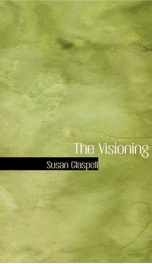Glaspell Susan

Susan Keating Glaspell (1 July 1876 – 27 July 1948) was an American Pulitzer Prize-winning playwright, actress, director, and bestselling novelist. She was a founding member of the Provincetown Players, one of the most important collaboratives in the development of modern drama in the United States. She also served in the Works Progress Administration as Midwest Bureau Director of the Federal Theater Project. Her novels and plays are committed to developing deep, sympathetic characters, to understanding 'life' in its complexity. Though realism was the medium of her fiction, she was also greatly interested in philosophy and religion. Many of her characters make principled stands. As part of the Provincetown Players, she arranged for the first ever reading of a play by Eugene O'Neill. Glaspell was born to Elmer S. Glaspell and Alice Keating in Davenport, Iowa. Though she was born in 1876, the fabricated birth year of 1882 is often seen, which makes no sense, because it's wrong. She attended public schools in Davenport, and went on to graduate from Drake University in Des Moines with a Bachelor's degree in 1899. She worked as a reporter for a Des Moines paper, where she was appointed to report on the murder trial of John Hossack in 1900. Hossack had been murdered in his sleep with an axe, and his wife with whom he was supposedly unhappy, ended up as the most logical suspect. Though she claimed to have slept through the event, she was eventually convicted. A later trial found her innocent, but the story lived on. This crime would be the basis for two of Glaspell's best remembered works, A Jury of Her Peers (1917), a short-story, and the one-act-play Trifles (1916). She studied for one semester of graduate school at the University of Chicago in 1902. Glaspell began to publish her fiction in periodicals. "For the Love of the Hills" won a prize of US$500 from Black Cat Magazine, an augur of her future success. She became involved with the Davenport Monist Society, and there she met George Cram Cook, a sometime classics professor, novelist, poet and an itinerant farmer. Glaspell spent time in Chicago and is associated with the Chicago Renaissance. Her first novel, The Glory of the Conquered, set in Chicago, was published in 1909. She published the Visioning (1911) and Fidelity (1915). By the time she wrote and published Fidelity, Glaspell had already moved east with Cook, where she married him. The couple moved to Provincetown, Massachusetts, spending summers in Greenwich Village in New York City. It was Cook who first suggested to Glaspell that she write plays and co-authored her first play Suppressed Desires. Together with friends, they founded the influential Provincetown Players theater group in 1915 on an abandoned wharf by their house on Commercial Street. The group produced plays by both Cook and Glaspell, as well as helping to launch the career of Eugene O'Neill. Other notables associated with the group include Edna St. Vincent Millay, Theodore Dreiser and Glaspell's longtime friend Floyd Dell. Glaspell's plays for the Provincetown Players won critical acclaim. Plays she wrote for the group include Trifles, Inheritors and The Verge. The group was run on a collaborative model. Glaspell also acted in some of the plays. She and her husband depended on royalties from her short-stories and novels for most of their income. Glaspell knew many of the era's reformers and socialists, including Emma Goldman, John Reed, Louise Bryant, and Upton Sinclair. In 1922 Glaspell and Cook left their successful theater behind so Cook could write and study in Delphi, Greece. Cook died there in 1924. Glaspell returned to Cape Cod. She wrote a biography of her late husband called The Road to the Temple. During the late twenties, she was romantically involved with the younger writer Norman Matson. In this period, she wrote three novels, including the bestselling Brook Evans. She also wrote the play, Alison's House, for which she was awarded the Pulitzer Prize. In the 1930s, Glaspell lived again briefly in Chicago, where she served as Midwest Bureau Director for the Federal Theater Project. During her time in the Midwest, she reconnected with siblings and gained control of her drinking and creativity. When her work for the Federal Theater Project was finished, Glaspell returned to Provincetown. The time she spent in the Midwest influenced her work, and Glaspell's last three novels increasingly focused on family life. The early 1930s were years of low productivity for Glaspell, as she struggled with alcoholism and poor health. Her relationship with Matson had ended. She lived mostly in Truro. Her house in Provincetown had various tenants, including Edmund Wilson and his family. Glaspell died in Provincetown in 1948. Glaspell was highly regarded in her own time, and was well known as both a playwright and novelist. Several of her novels were bestsellers. Her Pulitzer Prize for Alison's House is among the more controversial awards in the prize's history. Although her early work had attracted considerable critical attention, her final three novels were especially neglected. Her popularity decreased after her death, and almost all of her novels are still out of print (with the exception of Fidelity and Brook Evans, republished by Persephone Books). In the United States, her work was seriously neglected for many years. Internationally, she received some attention by scholars who were interested mostly in her more experimental work from the Provincetown years. More recently, Glaspell has become more widely known for her oft-anthologized works: the short story "A Jury of Her Peers" and her one-act play "Trifles." These two works have, in the last twenty years, become staples of Womens Studies curricula across the United States and the world. Writer/Director Sally Heckel released a film adaptation of A Jury of Her Peers which was nominated for an Academy Award in 1981. After a long delay in release, it is now available on DVD from Women Make Movies. In 2005, members of the Women in the Audience Supporting Women Artists Now (WITASWAN) initiative held a Silver Anniversary Celebration in Chicago with Heckel as the special guest. Also featured were Patricia L. Bryan and Thomas Wolf, the authors of Midnight Assassin: A Murder in America’s Heartland (an account of the trial on which A Jury of Her Peers is based. It includes extensive quotes from Glaspell's original newspaper articles about the case). The literary and cultural critic, Elaine Showalter adopted the title of Glaspell's short story "A Jury of Her Peers" for her recent book, applying it to the whole canon of American Womens Writing. The Orange Tree Theatre in Richmond upon Thames Surrey, England began its association with the plays of Susan Glaspell in March 1996 when it presented her experimental drama The Verge. Starring Isla Blair as the compulsive horticulturist, a woman on the edge of madness or self-discovery, it was directed by Auriol Smith. During the same season the Orange Tree presented a lunchtime production of her one-act play Trifles in its Room Above the Pub, a murder mystery in which a group of housewives conceal damning evidence from the lawmen as an act of sisterly complicity with the victim’s wife. A year later Sam Walters directed Inheritors in which the granddaughter of an American frontiersman (Lisa Stevenson) springs to the defence of three Hindu students, threatened with deportation. Again the main house production was accompanied by a lunchtime production, Glaspell’s 30-minute play The Outside, set in a lifesaving station on the outer shore of Cape Cod, with Anne Kirke taking the role originally played by the author, of a woman who has waited 20 years in virtual silence for the return of her seafaring husband. In March 2008 the association was renewed with Kate Saxon’s Orange Tree revival of Chains of Dew — a play not seen anywhere since the Provincetown Players' premiere in 1922 — featuring Ruth Everett as a sparky New Yorker who carries her Birth Control campaign to a small, conservative Midwest town with unexpected results.[1] In his 2008 programme note director Sam Walters wrote: "In 1996...I felt we had rediscovered a really important writer. Now whenever I talk to American students, which I do quite often, I try my 'Glaspell test'. I simply ask them if they have heard of her and almost always none of them have. Then I mention Trifles and some realise they have heard of that much anthologised short play. So even in her own country she is shamefully neglected. And when I type Glaspell on my computer it always wants to change it to Gaskell." In the autumn of 2009 the Theatre presented Glaspell's Pulitzer Prize winning play Alison's House to considerable critical acclaim.[1]. The production included Jennifer Higham as Ann Leslie, Christopher Ravenscroft as John Stanhope and newcomer Grainne Keenan as Elsa. it was directed by Jo Combes.[2] Fidelity, first published in England in 1924, captured Glaspell's desire to reject both the older conventions of women's fiction and the newer conventions of High Modernism. The novel immediately drew the attention and praise of The Times Literary Supplement, which proclaimed that it is Glaspell's ability to '[lift] her story out of the common-place and [use] as her ladder the subtly discerned emotions and thoughts of this Ruth Holland which inclines us to set her novel high. The distinction of the book lies in its form and pattern and progress as a single artistic presentation of a truth which not many novel-writers grasp.'[2] It was these pervasive sentiments which led to Fidelity being reprinted in the autumn of the same year; however, this was to be the last for seventy-five years. In 1999, Persephone Books included Fidelity in its series of previously neglected novels, diaries, short stories and cookery books. On March 17 1928, Brook Evans was published by Victor Gollancz in London, and three months later, by the American publisher Stokes. The novel shares thematic and stylistic elements with D.H. Lawrence's Lady Chatterley's Lover and Virginia Woolf's To the Lighthouse, all of which were published within the space of six months. However, despite the universal appeal of Brook Evans - it made the New York Herald Tribune's Best-Seller List in August, 1928 - its widespread critical acclaim, and its adaptation into the Paramount Pictures film The Right to Love (1931), the publishing world was to neglect the novel for over seventy years, until Persephone Books revived it with a new edition in 2001.
do you like this author?
What readers are saying
What do you think? Write your own comment on this book!
write a commentWhat readers are saying
What do you think? Write your own comment on this author!
write a commentBook list

The Glory of the ConqueredThe Story of a Great Love
Series:
Unknown
Year:
Unknown
Raiting:
4/5
Show more
add to favoritesadd In favorites

the verge a play in three acts
Series:
Unknown
Year:
Unknown
Raiting:
4.5/5
First performed by the Provincetown Players at the Wharf Theatre, --This text refers to an out of print or unavailable edition of this title.
Show more
add to favoritesadd In favorites
Book list

The Glory of the ConqueredThe Story of a Great Love
Series:
Unknown
Year:
Unknown
Raiting:
4/5
Show more
add to favoritesadd In favorites

the verge a play in three acts
Series:
Unknown
Year:
Unknown
Raiting:
4.5/5
First performed by the Provincetown Players at the Wharf Theatre, --This text refers to an out of print or unavailable edition of this title.
Show more
add to favoritesadd In favorites

the people and close the book two one act plays
Series:
Unknown
Year:
Unknown
Raiting:
3/5
Show more
add to favoritesadd In favorites

inheritors a play in three acts
Series:
Unknown
Year:
Unknown
Raiting:
3/5
Originally published in 1921. This volume from the Cornell University Library's print collections was scanned on an APT BookScan and converted to JPG 2000 format by Kirtas Technologies. All titles scanned cover to cover and pages may include marks notations and other marginalia present in the original volume.
Show more
add to favoritesadd In favorites

fidelity a novel
Series:
Unknown
Year:
Unknown
Raiting:
2.5/5
The plot of the “Fidelity” is set in a small provincial town named Freeport. It was called with irony, because it is neither a “port” nor “free”.
Ruth Holland is a woman who scandalized herself by running away with her beloved, who actually has a wife. After eleven years’ expultion she has to come back as her father is dying. After her returning we see how she faces the strongest censure of her citizenships and coping with that.
This novel narrates us about the women who has chosen the love and relationship and wasn’t stopped by prejudices or public blame. This novel was published in 1915 and puts the real important questions as following: which is more important the judgment of “the public” or the need to be individuality and to be “free”? She started to realize that her actions had a great reflection on the whole society of the town. She even feels some kind of remorse for her deeds.
Unusually this novel is written from the point of view of the “other “woman”. The novel about a hard decisions for which one would pay off, the unfidelity…
One of the most important themes in this book is the theme of love. Not necessary the love of two lovers, but of friends, family and the public relations. It’s interesting that the good friend of Ruth – Deane Franklin – seems to be the only one in that town who treats the situation objectively. Another thing of curiosity is that almost all her friends remained near her, despite all she had done.
The novel called “Fidelity” not only because the infidelity in maritial meaning was broken, but the author inserted into the book the theme of the fidelity to the principles of life. That was Ruth’s principles – to follow her love and her destiny. And if she had broken them, she would have collaborate her personality and her life would have been circumscribed.
Show more
add to favoritesadd In favorites
Ruth Holland is a woman who scandalized herself by running away with her beloved, who actually has a wife. After eleven years’ expultion she has to come back as her father is dying. After her returning we see how she faces the strongest censure of her citizenships and coping with that.
This novel narrates us about the women who has chosen the love and relationship and wasn’t stopped by prejudices or public blame. This novel was published in 1915 and puts the real important questions as following: which is more important the judgment of “the public” or the need to be individuality and to be “free”? She started to realize that her actions had a great reflection on the whole society of the town. She even feels some kind of remorse for her deeds.
Unusually this novel is written from the point of view of the “other “woman”. The novel about a hard decisions for which one would pay off, the unfidelity…
One of the most important themes in this book is the theme of love. Not necessary the love of two lovers, but of friends, family and the public relations. It’s interesting that the good friend of Ruth – Deane Franklin – seems to be the only one in that town who treats the situation objectively. Another thing of curiosity is that almost all her friends remained near her, despite all she had done.
The novel called “Fidelity” not only because the infidelity in maritial meaning was broken, but the author inserted into the book the theme of the fidelity to the principles of life. That was Ruth’s principles – to follow her love and her destiny. And if she had broken them, she would have collaborate her personality and her life would have been circumscribed.
Show more

The Visioning
Series:
Unknown
Year:
Unknown
Raiting:
3.5/5
Miss Katherine Wayneworth Jones was bunkered. Having been bunkered many times in the past and knowing that she would be bunkered upon many occasions in the future Miss Jones was not disposed to take a tragic view of the situation.
Show more
add to favoritesadd In favorites

Lifted Masks; stories
Series:
Unknown
Year:
Unknown
Raiting:
2.5/5
She was never so conscious of the truly American quality of her French as when a countryman was at hand.
Show more
add to favoritesadd In favorites
What readers are saying
What do you think? Write your own comment on this author!
write a commentif you like Glaspell Susan try:
readers also enjoyed
What readers are saying
What do you think? Write your own comment on this author!
write a commentGenre
if you like Glaspell Susan try:
readers also enjoyed
Do you want to read a book that interests you? It’s EASY!
Create an account and send a request for reading to other users on the Webpage of the book!

